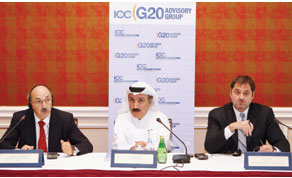By Santhosh V Perumal/Business Reporter
Nations comprising the G20 must tackle the threat of growing protectionism and produce a “credible” action plan to restore confidence, stimulate economic growth and create jobs, leading corporate sector executives from the Middle East and North Africa (Mena) region stressed in Doha yesterday.

From left: Carrier, Rowhani and Hardy address the media after the ICC regional consultation with key officials of Mena companies
Moreover, they also sought specific tangible actions from the G20 regarding an institutional framework for investments, reducing trade barriers and the re-launch of Doha Round of trade negotiations under the World Trade Organisation.
These, along with the need for establishing regional working groups, were made at a regional consultation of the International Chamber of Commerce (ICC) with the top officials of leading companies in the Mena region on key business messages for the leaders of the G20 when they meet at Cannes next month.
The meeting was hosted by ICC Qatar and Qatar Chamber of Commerce and Industry chairman Sheikh Khalifa bin Jassim al-Thani, who is also a representative of the ICC G20 Advisory Group.
The Mena meeting in Doha, which comes as part of a series of regional consultations in Mexico, Hong Kong and Zurich, was attended by business leaders from nine countries and those included key officials from Shell Qatar, Qatar Financial Centre, al khaliji, Doha Bank and Qatari Diar.
“Economic growth depends largely on the capacity of the G20 governments to improve the conditions of international trade. However, what we are seeing is that protectionist measures are growing within the G20. This trend must be reversed and more needs to be done to dispel the myths that trade results in job losses,” ICC secretary general Jean-Guy Carrier told the media.
He said it was time again for the leaders of the G20, which constitute more than 85% of the world gross domestic product, to work together and agree a plan that would stabilise the world economic order.
As the G20 had done in response to the financial crisis in 2008, measures taken by each of the members, in accordance with their circumstances, would have a “positive” cumulative effect on the global economy, Carrier said.
“We see the minimum requirement for progress in Cannes to be credible action by the G20 to stem the sovereign debt crisis, sustain global trade and take steps to deal with the long-term unemployment. But at the same time tackle stubborn issues in the emerging economies,” he said.
Jeff Hardy, ICC G20 Advisory Group co-ordinator, said the G20 have been asked to take a “hard look” at the volatility in the financial markets, which were “dangerously” impacting the real markets of products and services.
Highlighting that worsening global economic conditions had renewed the urgency for the governments to make job creation a priority, despite strained public finances, Carrier said “our group stressed that in order to get the world economy back to healthy growth, the G20 governments need to rebuild businesses’ faith that the crisis will be addressed effectively.”
“The economies of the Mena are a critical element of global economic growth and it is therefore a valuable opportunity for our local and regional business leaders to contribute to the solutions,” Sheikh Khalifa said.
Finding that economic realities were fast changing and forcing businesses to adapt and come up with forward-looking measures to support open national economies, ICC Qatar CEO Remy Rowhani said “The Gulf can bring its unique business experience to bear on the G20 process.”
The Doha consultation aimed at picking up from where the Doha Round left off in charting a new course for renewed economic opportunities for the world in general and for about 600mn, mostly young people in Mena, in particular, he said.

